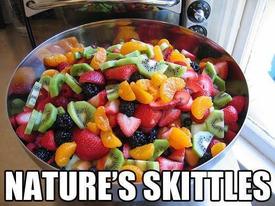Is healthy food really more expensive?
Replies
-
Yea It definitely is for me but it is worth it.0
-
Depends on what you eat. Overall it's cheaper for us.....we don't buy as much junk food (cookies, chips, pop, crackers, frozen meals) as we used to
We spend roughly ~350 a month on food for 3 people. And that includes meat that we purchase 1 or 2x a year and freeze for use. And I'm not a sales or coupon shopper. And I live in WY, not an area known for cheap produce.....even at farmers markets.
(bought half a grass fed local cow last year since we didn't get an elk or deer last year.....didn't get to go hunting)
If produce we bought looks like it's going to reach the end of it's life, soup or something similar gets made and then tossed into the freezer for quick dinners/lunches in the future.0 -
USDA did a study on this a year ago... Follow the link to check out the tables and stats if you're interested.
http://www.ers.usda.gov/publications/eib-economic-information-bulletin/eib96.aspx#.UcSB678b7ww
The findings of the study were:
In terms of price per calorie, foods higher in calories tend to be less expensive than low calorie foods, particularly vegetables. But, grain foods are the cheapest per calorie, even cheaper than "moderation foods." Protein foods, mixed dishes, and dairy foods land in the middle. (pp. 16-17)
In terms of price per edible 100g, dairy is the cheapest choice. Protein foods are the most expensive, with "moderation foods" being the third most expensive (of the food groups in the study). (p. 18)
Regarding price per average serving size, grains were the cheapest again, with vegetables and dairy falling in second cheapest per serving. Mixed dishes, which can tend to be larger portions, were the most expensive per serving. (p. 20)
"When making food choices, consumers may need to consider the entire
cost of their diets. Cheap food that provides few nutrients may actually
be “expensive” for the consumer from a nutritional economy perspective,
whereas a food with a higher retail price that provides large amounts of
nutrients may actually be quite cheap. Consumers should also consider the
total daily cost—which is likely the one metric that will have the most relevance
to consumers trying to control their food budgets." (p. 30)0 -
Before I got better at cooking and created some go-to meals, I would go to the store with a couple recipes and spend a TON of money buying non-seasonal vegetables, spices, or bottles of condiments when I would only need 1 tsp. Now, I can cook without a recipe pretty well and make meals with what we have on hand. I am lucky that I can buy seasonal vegetables a large bag of seasonal vegetables for around $30 and supplement with frozen veggies, quinoa or rice, and frozen proteins like fish, chicken breasts, turkey burgers, etc. We definitely eat a lot less processed food - I was shocked at the prices of candy, potato chips and microwave dinners the other day when I went to the store. I also take my lunch which saves $10 - $15 a day.0
-
If you live in an urban food desert, fresh fruits and veggies may not be as available to you. And it's probably never going to be cheaper than McDonald's value meal dollar menu.
I don't disagree with you that for many people fresh fruit is going to be pricey. But I don't consider fast food burgers a valid comparison--canned and frozen fruits and veggies can be a very good option and the price per serving is likely going to be less than that burger.
Not that I disagree with you. I think frozen veggies are a good affordable option -- and cheaper than many of the processed items people are comparing them to. (I have a few different bags of frozen veggies in my freezer most of the time).
But then I also have easy access to grocery stores.
There are urban areas where this is not easily the case.
And valid comparison or not, there are people comparing cooking at home to McDonalds. Personally, I home cook 90% of my meals, grow my own tomatoes and herbs, regularly visit the farmers market, and haven't eaten at McDonalds in a year. There are, however, people who are eating out of McDonalds (either due to availability, ease, or preferance) and at the end of the day, their $1 menu may be cheaper. Healthier? Oh, hell no. And for MOST people it's really a matter of what you prioritize (but not for all people. There are issues of locality, income, etc.)
Still, I think for most people there are healthy options available even on a budget.0 -
For us it's the same. We eat vegetarian twice a week, we buy organic produce, dairy and meat, conventional and whole grain for everything else. I cook and plan out meals and we also get what we can locally. I this is aspect is key to keeping it affordable. We also keep chickens which lay cheap organic, free range eggs (they also eat all my table scraps and make amazing compost). I grow a vegetable garden. I watch sales.
I keep an annual calender of when meats and produce are in season and buy directly in bulk from the farmer. I just bought 40lbs of organic strawberries for less than $2 a pounds and I have ~300 lbs. of organic, free range beef coming in July what I paid about $3.50/ lb for. There are always free roosters available on craigslist, so if you know how to butcher a chicken . . winner, winner.
It is a whole lot more work, but I can feed my family of 5 for under $200/week (and that includes sundries).0 -
USDA did a study on this a year ago... Follow the link to check out the tables and stats if you're interested.
http://www.ers.usda.gov/publications/eib-economic-information-bulletin/eib96.aspx#.UcSB678b7ww
The findings of the study were:
In terms of price per calorie, foods higher in calories tend to be less expensive than low calorie foods, particularly vegetables. But, grain foods are the cheapest per calorie, even cheaper than "moderation foods." Protein foods, mixed dishes, and dairy foods land in the middle. (pp. 16-17)
In terms of price per edible 100g, dairy is the cheapest choice. Protein foods are the most expensive, with "moderation foods" being the third most expensive (of the food groups in the study). (p. 18)
Regarding price per average serving size, grains were the cheapest again, with vegetables and dairy falling in second cheapest per serving. Mixed dishes, which can tend to be larger portions, were the most expensive per serving. (p. 20)
"When making food choices, consumers may need to consider the entire
cost of their diets. Cheap food that provides few nutrients may actually
be “expensive” for the consumer from a nutritional economy perspective,
whereas a food with a higher retail price that provides large amounts of
nutrients may actually be quite cheap. Consumers should also consider the
total daily cost—which is likely the one metric that will have the most relevance
to consumers trying to control their food budgets." (p. 30)
Wow this is great thank you for sharing! It's so interesting to hear everyone's perspective. I guess it comes down to where you live and how much thought you put into it.0 -
Interesting variety of replies. For me, as a single gal, it is much cheaper to eat healthy. I used to spend around $8-10 a day for lunch. When I make my own, it is healthier and it comes in around $2.50 a day. Same for breakfast. I used to spend about $5 for a breakfast sandwich, but I can make my own for a dollar or so. We usually go out for dinner, so no savings there, but if I weren't dating the world's pickiest eater and cooked my own dinners I have no doubt they would be much cheaper.
I suppose you could counter my story by pointing out how cheap frozen meals are, but since they never fill me up I just end up at the vending machine 20 minutes later, spending more money on unhealthy food. Same goes for Ramen noodles. They fill me up for maybe an hour, then I need more food. To get the same level of satiation (not even considering nutrition), I would spend far more on unhealthy food than on stuff that's good for me.0 -
Up front cost yes long term healh benefits no. When you say is it more expensive I guess I would take into consideration all factors. Such as processed foods have tons of sodium which increases blood pressure and fat builds up in your arteries and can casue strokes ect ect ect ect and on and on and on.0
-
I keep hearing online and in conversation with friends and coworkers that it's so much harder to eat healthy because healthy foods are more expensive. I am torn on the subject because I know produce can be expensive and can depend on your area. But I also know that when you eat healthy, you buy less junk foods and maybe even less food overall. I'm curious, what are your thoughts? It is a cop out or it is eating healthy really cost prohibitive?
if by healthy you mean unprocessed..then no, it is not more expensive. you can eat healthy on a college student's budget. you might have to sacrifice some variety and taste but it can be done.0 -
It depends on what you're comparing. I can get a bag of potato chips for $3.99, or a 5 pound bag of oranges for $3.99. I can make healthier burgers and fries at home for less than a trip to McDonalds. But if your idea of healthy is organic-only, then it might be more expensive.0
-
Yes, in general it costs more for high quality/fresh/healthy foods. However, I think that everyone should think of it as an investment. The food we eat has such a large impact on our health that by buying quality products you are investing in your body. Your body is the most valuable thing you have, and should be treated as such. The investments you make in time and money for a healthier life will be covered by how much money you save from not having to pay for as many medical treatments down the road.
Pay more for great food now --> Pay less for terrible medication later0 -
Depends. It's possible to eat healthy and it be more expensive and it can also be less expensive...and it's possible to eat unhealthy and it be more/less expensive.
The problem is, someone suddenly decides to eat "healthy", so they go on a "healthy" shopping spree...and they don't know the tricks to getting the best deal and they pay full price for everything because they haven't caught sales on the "healthy" food when they could stock up.
To get a good deal on *anything*, it helps to have knowledge, patience, experience, practice, etc.0 -
In my area, farmer's markets are outrageously expensive. It's often far more than grocery store prices and some stuff isn't even locally grown.
If you live in an area that has them, Latino and Asian grocery stores are often far, far cheaper than standard grocery stores for fruits, vegetables, herbs, meats and fish rice, beans, etc.0 -
Of course you can buy crackers, chips, etc for cheap - but they don't keep you full for very long. I've found whole foods last me in satiation a hell of a lot longer than processed "food" ever did.
Besides, what you spend on healthy groceries, you should save in the longrun on medical expenses and prescriptions! :drinker:0 -
You can't put a price on health. Cut out something else from your life to compensate if it's too much. For example, cancel your cable subscription to compensate. That is a win win because it keeps you off the couch and let's you buy healthier food. Also, not eating out as much helps as well.0
-
Depends. It's possible to eat healthy and it be more expensive and it can also be less expensive...and it's possible to eat unhealthy and it be more/less expensive.
The problem is, someone suddenly decides to eat "healthy", so they go on a "healthy" shopping spree...and they don't know the tricks to getting the best deal and they pay full price for everything because they haven't caught sales on the "healthy" food when they could stock up.
To get a good deal on *anything*, it helps to have knowledge, patience, experience, practice, etc.
QFT0 -
The problem is, someone suddenly decides to eat "healthy", so they go on a "healthy" shopping spree...and they don't know the tricks to getting the best deal and they pay full price for everything because they haven't caught sales on the "healthy" food when they could stock up.
To get a good deal on *anything*, it helps to have knowledge, patience, experience, practice, etc.
THIS0 -
No.
I just did my shopping list for payday on Tuesday.
I live with a friend from work, so we get our own stuff then go halves on things like salads and things we both eat. Basically, I buy veggie food and she buys meat and junk food.
My diary will go something like this:
Breakfast: Coffee + half a grilled veggie sausage sandwich (enough to keep me full as it's okay for protein but I'm never hungry in the mornings, hence the half portion)
First break at work: Porridge with some protein power and skimmed milk
Lunch: Quorn chicken salads or stir-fry or veggie Bolognese
Second break at work: Coffee and a yogurt. Then if it's a gym day I will have a protein bar afterwards
Dinner: Whatever. Salads, vegetables, pizza...
I'd class that as 'healthy' because it's pretty balanced. I would never cut out anything. The ingredients come up to around £25 for the week. I already have the whey for the porridge, though.
Frozen veg, eggs, bulk buy with offers...0 -
I keep hearing online and in conversation with friends and coworkers that it's so much harder to eat healthy because healthy foods are more expensive. I am torn on the subject because I know produce can be expensive and can depend on your area. But I also know that when you eat healthy, you buy less junk foods and maybe even less food overall. I'm curious, what are your thoughts? It is a cop out or it is eating healthy really cost prohibitive?
I just totaled up my grocery receipts so far for the month of June: $77.41 for one adult. That doesn't include several restaurant meals that were just for fun, not a regular part of my diet.
I stopped buying junk food in April 2013. My diet base is organic brown rice, lentils, and fresh vegetables, plus Green Mountain espresso. Once in a while I'll eat an egg or some tuna, but I'm trying to cut out the tuna. I don't buy other meat, alcohol, desserts, or treats like special condiments. I'm also not trying to eat as cheaply as possible -- it's just ended up that way.0 -
You can't put a price on health. Cut out something else from your life to compensate if it's too much. For example, cancel your cable subscription to compensate. That is a win win because it keeps you off the couch and let's you buy healthier food. Also, not eating out as much helps as well.
Yes! Pay for health now, save in the long-run; or, buy junk now and pay for illness and obesity-related diseases later.
Exercise doesn't have to cost a ton either. Good running shoes and a good sports bra (for us ladies) = $75. Then, run on trails. No gym fee required. :happy:0 -
I keep hearing online and in conversation with friends and coworkers that it's so much harder to eat healthy because healthy foods are more expensive. I am torn on the subject because I know produce can be expensive and can depend on your area. But I also know that when you eat healthy, you buy less junk foods and maybe even less food overall. I'm curious, what are your thoughts? It is a cop out or it is eating healthy really cost prohibitive?
It's absolutely more expensive. And much more time/enegry consuming to prepare. It goes bad faster as well. But if you have the money and the time, I think you should stick with it anyway.!Think of it as an investment in health.0 -
I'm guessing I'm in the lower percentile for MFP users here, but we are a family of five and very low income, living in a place where nothing grows locally (a food desert.) So food is our biggest expense, next to rent.
This week I spent $15 at the discount grocery on:
- a gallon of milk
- a small loaf of low-end quality bread
- a frozen veggie pizza
- a bag of frozen vegetables
It's not a lot of money, but it's also not a lot of food. And when you've only got $50 every two weeks to feed five people, fresh veggies are not always on the menu.0 -
It also depends on how you define 'health' food.
A single burger with mustard is cheap and if not health, at least not unhealthy.
A couple of burgers with cheese, mayo, a side of fries and a can of coke is definitely more expensive and unhealthy.
I've learned that health food is less about health, and more about proportion. As another example consider spaghetti. A big carb and calorie bomb, but cheap right? That's if you're having tomato paste based sauce with ground beef and cheese on a heaping plate. But what if you're having a small bowl with a chopped tomatoes instead? Cheap and healthy.
Choose your food wisely but also in the proper proportion.0 -
Per calorie eating healthier is quite often more expensive. However, if you are cutting 500-1000 calories a day and eating out less it won't be that much more. In some cases there are people that actually spend less on food when they eat healthier. It is really going to depend on your preferences and how smart you shop.0
-
Fyi i've seen (and bought) a lot of vegetable/fruit items at the dollar store (99 Cents Only stores to be exact....i'm in Houston)
They have name brand bagged salads (Dole, Fresh Express) lemons, green peppers, green beans, onions. I've seen oranges, apples, limes and bananas as well. The expiry dates on the salad are usually 5-7 days away, the vegetables/fruit looks fresh and decent0 -
Let's face it - McDonald's has access to cheaper hamburger than anyone who isn't a farmer. Even after markup and making a profit, they still undercut... not in places like, say, North Dakota, but not everyone lives there and we're not comparing hamburgers to hamburgers. We're comparing portioned healthy things to them, which is where the dollar menu starts to lose.
Here's the cost breakdown of my lunch. These are at those North Dakota prices I keep saying aren't applicable to everyone, and sale prices at that... and at double what I spent, it would still be cheaper than the dollar menu.
.11 - serving of pasta (1lb box = .88)
.50 - serving of beef (1lb = 1.98)
.18 - serving of green beans (1lb frozen = .88)
.09 - 1/3 medium onion (2lb bag = 1.60)
.50 - 1/2 cup cottage cheese (tub = 2.50)
Total: 1.38
Side note: this was assuming someone ordered at least three things on said dollar menu... and as someone who worked at one, that was what I observed to be the rule rather than the exception.0 -
I think it really depends on how much income your family brings in and how many people are in your family and how many calories a day each person needs...And if some people/person in the family unit eats more than they needs regardless of what their calorie need is. There are times when we will spend like $200 on fresh fruit, veggies, and lean meat and it will barely make it to our next pay check.
But everyone is contributing and it's not just me and my mom buying, and we eat it to match our calorie needs, it's very inexpensive and we're able to save money.0 -
it's probably never going to be cheaper than McDonald's value meal dollar menu.
I've never had anything on a dollar menu that actually left me feeling satiated or full. I can eat like 10 Mc Donalds cheese burgers before I feel remotely satiated.
Plus...all these people that can barely eat more than 1,000 calories because broccoli is so filling really shouldn't have too many grocery budget issues.0 -
No.. i dont think it really is more expensive..
Ok, i am eating a ton more fresh fruit... and fish, fish can be an added expense when your the only one in the family that eats it. But it just replaces the amount of crap i used to buy.
example binge night after a late shift: burger king bacon double cheese xl meal (large) x2 (1 for me 1 for the oh) normaly about £13.50, bottle of coke £1.99, bag of doritos £1.50, pot of hummus £1.50 Total £18.49
When i buy my fruit and salad stuff its about £15.. but last more than one night, an im the only one eating it.
I buy my meat/poultry from a butchers outlet which is cheaper than local supermarket.0
This discussion has been closed.
Categories
- All Categories
- 1.4M Health, Wellness and Goals
- 398.2K Introduce Yourself
- 44.7K Getting Started
- 261K Health and Weight Loss
- 176.4K Food and Nutrition
- 47.7K Recipes
- 233K Fitness and Exercise
- 463 Sleep, Mindfulness and Overall Wellness
- 6.5K Goal: Maintaining Weight
- 8.7K Goal: Gaining Weight and Body Building
- 153.5K Motivation and Support
- 8.4K Challenges
- 1.4K Debate Club
- 96.5K Chit-Chat
- 2.6K Fun and Games
- 4.8K MyFitnessPal Information
- 13 News and Announcements
- 21 MyFitnessPal Academy
- 1.6K Feature Suggestions and Ideas
- 3.2K MyFitnessPal Tech Support Questions





















